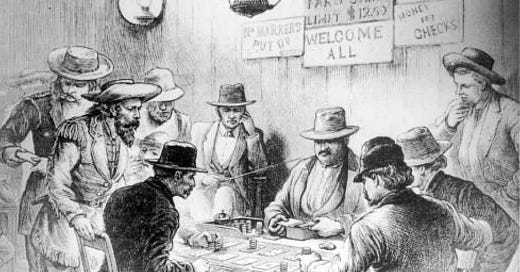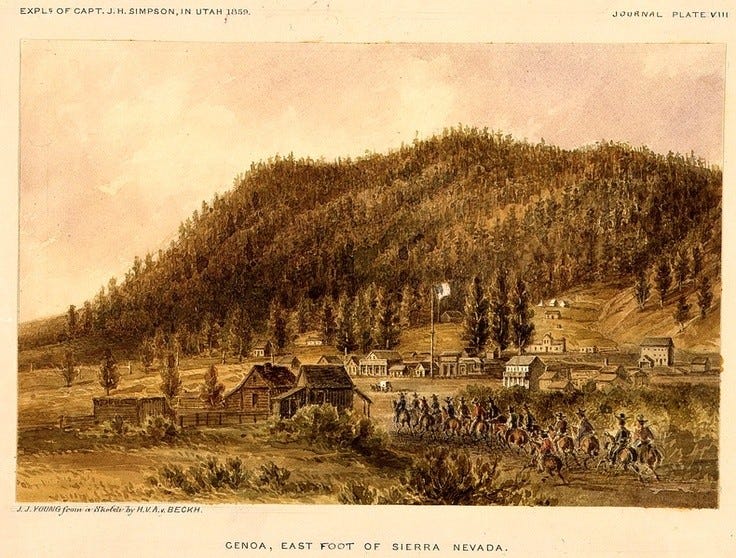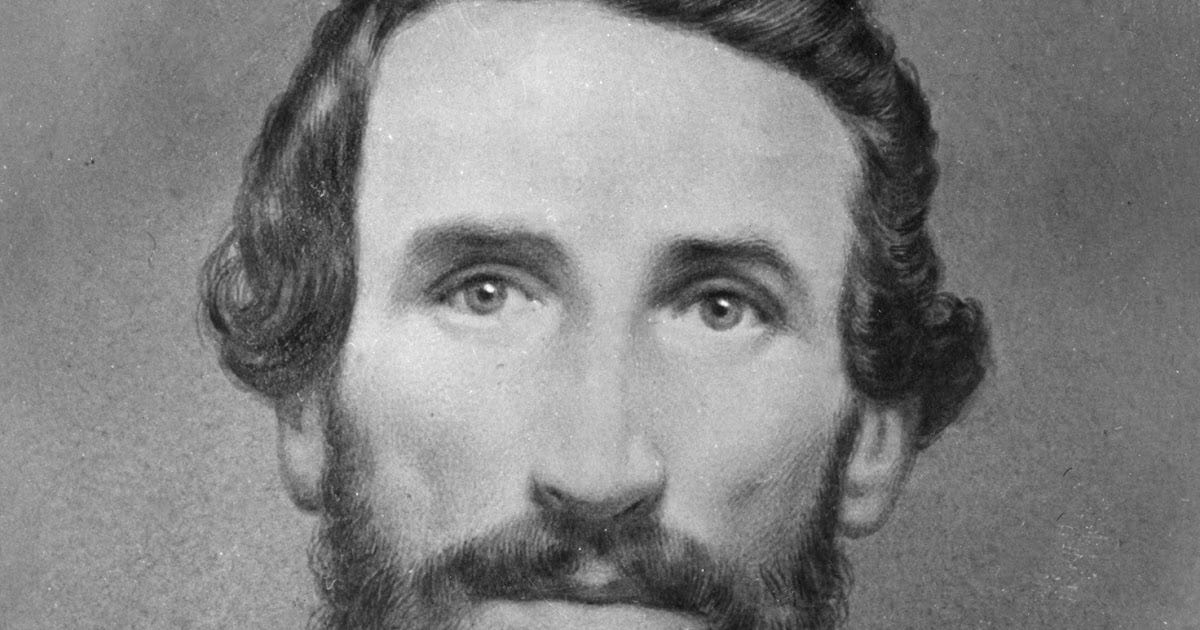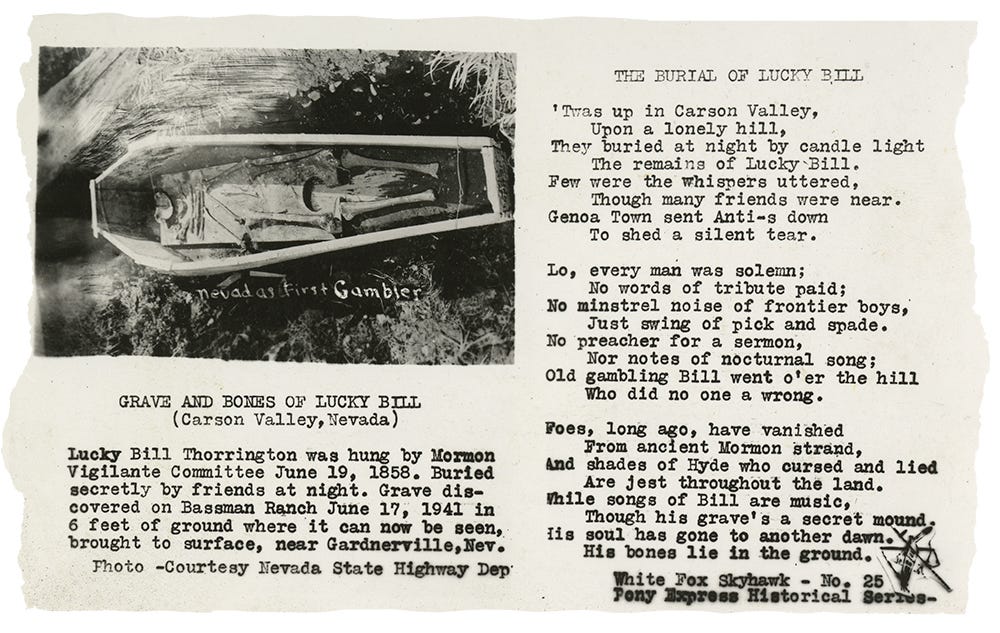The life and death of William 'Lucky Bill' Thorington
A largely forgotten man played a key role in early Nevada history - he was free-spirited, he was lawless, he was industrious and wealthy - and he was hanged.
Quintus Hopper of Nevada, published in January 2022, is a historical novel that follows the epic and peculiar life of a frontier newspaper typesetter. As part of my research I made extensive use of newspaper archives and, in this series, I’ll share some of my often surprising findings. Here are history, commentaries and contemporary newspaper articles as they relate to the novel. This time, meet Lucky Bill.
At the time of the California gold rush, and until a good ten years later, the eastern side of the Sierra Nevada mountains was barely populated by white men. It was wilderness and, for the most part, only land that needed to be crossed on the way to the promised land, California. That land was, at the time, part of Utah Territory. However, Salt Lake City, with its rules and its laws, was so far away that Carson Valley was a place of pervasive lawlessness.
The few that were there, liked it that way. The departure of some of the Mormons in 1857, and the arrival of more settlers, changed the dynamic. As described in the novel, Major William Ormsby (who died later because of an incredibly arrogant - and stupid - attack on Paiute Indians) led the side that aimed for a separate Nevada Territory, and thus a new capital and a land of laws. The more free-spirited men, let’s call them that, only saw the potential arrival of laws and taxes – and so, vigorously, fought against Ormsby and his ideas.
The below article in Placerville’s Mountain Democrat, gives in full the letter sent in by a certain ‘Jerry’ from the other side of the mountains. It gives a vivid account of what life in Carson Valley was like at the time, and highlights the hanging of Lucky Bill Thorington – a strong opponent of Major Ormsby. It also introduces Lucky Bill’s son Jerome – who, in the novel, becomes one of Quintus’ best friends.
Before William Thorington became “Lucky Bill” in California, he had honed his skills at Three Card Monte and the Thimble Game by hustling settlers. He found the perfect place for it in a trading post called Ragtown on the Carson. After the long haul from Salt Lake City and the crossing of the Forty Mile Desert, settlers arrived at Ragtown covered with dust, starved and dying of thirst. The place, nothing more than a log cabin and a few tents, offered vegetables, flour, livestock, alcohol … and gambling.
After the many depravations, Ragtown was heaven for the weary travelers and William Thorington was there with cheer, with laughter, with stories – and with a set of very quick fingers. Cards would fly and thimbles would move and always his digits were beyond the pace of eyes that were so easily deceived. It didn’t take long for Thorington to take his skills to the other side of the Sierra Nevada, where, in places like San Francisco, Sacramento and Placerville, miners were itching to part with their fortunes.
By early 1853, Thorington had decided that California was detrimental to his health – it was also becoming increasingly cumbersome with rules and laws popping up at every corner. There was a better place, a place where rumors of gold were beginning to be whispered, a place without laws. Thorington moved to Carson Valley and realized that a new world was a chance to become a new man.
Carson Valley was beyond the laws of California – and although it was officially part of Utah Territory, it was as far from Salt Lake City’s justice as was the moon. With thousands of dollars in his bags, the gambler William Thorington became the landowner William Thorington. He loaned money where needed, helped where he could, built fresh toll bridges at Carson Canyon and the first brick kiln in the valley, introduced irrigation, and soon was also the owner of a sawmill. Within just one year, Thorington became the wealthiest man in western Utah Territory.
June 26, 1858
The Mountain Democrat, Placerville
GENOA, (Carson Valley) June 21, 1858
EDITORS MOUNTAIN DEMOCRAT: I regret that I could not send you any news for your last issue. Excitement, the most intense and absorbing, has been prevalent here for the last week, scarcely paralleled by that of the Vigilance Committee of San Francisco in 1856.
It is well known throughout California that Carson Valley and the valleys East of the Sierra mountains, have been for a long time past infested with thieves, and been the great resort and lurking place for all fugitives from justice of your State; and that frequently such persons have been re-arrested here and taken back, tried and punished according to law. In this letter, I shall not endeavor to give you the evidence, but merely a synopsis: I do this at the earnest solicitation of parties most concerned. In a week or two I will send you a full and authentic copy of all the evidence, to be treated as you deem proper.
You have, doubtless, heard of the murder of one Henry Gordier, committed in Honey Lake Valley in March of April last. He had been murdered or missed about a month or six weeks, when the citizens of the former place became suspicious that there had been foul play somewhere; and that Gordier, the Frenchman, had been murdered. Search was instituted and the body was discovered. Suspicion rested upon a certain party; moves were made to find out and arrest the murderer and mete to him his just punishment.
Edwards (he was proven to be the same Edwards who murdered Snelling at Snelling’s ranch, Merced river, last fall) was suspected – he having something to do with the stock of the murdered man. Through the ingenuity and stratagem of Messrs. Elliott and Gilpin, of Honey Lake Valley, they learned from W. B. Thorington that Edwards was secreted in and around this valley, and that he (Thorington) knew his whereabouts and would take Elliott and Gilpin to seek him, Edwards. This was after Elliott and Gilpin had gained entire confidence of Thorington and others.
“Lucky Bill,” or rather Thorington and his friends, at first seemed to be afraid of Elliott, and used the utmost precaution before Thorington divulged anything of interest.
It was proved that Thorington left this valley last March; that he had been in Honey Lake Valley the same month; that he there had an interview and conversed with Edwards; that he talked of buying Gordier’s cattle in connection or in partnership with Edwards; that Thorington left this valley to go to Honey Lake Valley or in that direction in search of a man by the name of Steward, supposed to be the murderer of Mr. Wade, who had been murdered on the East Fork of Carson River last fall. Winnemuk – son of the chief of the Piute tribe – had informed Thorington that there was a white man among the Indians, whose description corresponded precisely with that of Steward. Thorington and his party did not find Steward; went to Honey Lake Valley, and there, as before stated, saw Edwards, together with Elliott and Gilpin, and talked as above stated about the Gordier cattle.
After Elliott and Gilpin had gained the confidence of Thorington, and had everything arranged, (as you will learn from the evidence when I send it to you,) W. B. Thorington, Jerome Thorington, (son of W. B. T.) John H. McBride and Orin Gray, of this place, and Lute Olds, Cal. Austin and Isaac Gandy, of the upper end of the valley, were arrested and taken to the “Clear Creek Ranch” for an investigation to be made by the people of this and the adjoining valleys. Edwards was arrested last night (Monday night) through and by the stratagem of Jerome Thorington. Jerome had been in the habit of carrying food to Edwards, and enticed him to go with him, to his father’s ranch, on the East Fork of Carson River, where and when Edwards was arrested. Edwards entered the house with his gun cocked, determined, as he said, to shoot down any one whose appearance indicated hostility or whom he did not like (it appears that he was rather suspicious).
Theodore Winters gave him a lick over the head with a club, knocking him down, and then the party secured him without difficulty. Edwards is a desperate man, revengeful and determined. The Honey Lake people left the valley yesterday morning with Edwards. I understood it was their intention to take him to Honey Lake Valley to hang him.
At “Clear Creek Ranch” it was proved that there was a gang or band of thieves and harborers of murderers in this valley. There was not, however, sufficient proof to hang a man elicited on the trial, where courts are properly organized. The strongest proof of villainy fell upon Thorington. By the unanimous vote of eighteen jurors, Thorington was brought in guilty, and sentenced to be hung till dead – and awful sentence. Olds and Austin were sentenced to pay a fine (I forget the amount) and leave the valley within forty-eight hours from the time the shackles were knocked from them. Nothing being proved against Messrs. Gray, Gandy and McBride, except being friends and sympathisers of Thorington’s party, they were set at liberty. Jerome Thorington was released by his promising to tell all he knew about the affair, except in relation to his father. He did so. Jerome is a young man, being in his seventeenth year, a mere boy, of fine intellect; and had he listened to the judicious admonitions of his mother, and resisted the influence of parties steeped in crime, he never would have been implicated in this deplorable, disgraceful affair. It is hoped, from his own promises, that in future he will be a different man and avoid bad company, for surely he has had a terrible ordeal to pass through. The knowledge of the disgraceful death of his father, who was hung Saturday the 19th of June, 1858, between the hours of 3 and 4 o’clock P.M., must for ever be a warning to him.
Now I wish to say something in relation to the prejudice and excitement sought to be created against Major Wm. M. Ormsby. Thorington and some of his friends have endeavored and in fact have made some people believe, that Major Ormsby has been the sole cause of all the excitement, because Thorington and Major O. were enemies, and Major had influence, &c. Now, Messrs. Editors, I know you will believe me; let your readers, as to their belief, decide for themselves when they shall have heard a correct statement of this unfortunate affair. I know all who know me will believe my statement. In the first place I know Ormsby had nothing to do or say in this affair, only in searching out crime and bringing the guilty to trial. To use Elliott’s own words – “Lucky Bill would be in the same position, if Major Ormsby never had seen Carson Valley.”
I have purposely avoided giving the following points of the evidence, in order that I might now introduce it in connection with Major O.’s part of the case. It was proved that Thorington had engaged in a plot to murder Mr. Barber, and “that he would give – (the amount not remembered) dollars to have Major Ormsby killed, or Richard Sides, it made no particular difference which, or both, that they were enemies of his, Thorington’s.” Who can blame Major O. for wanting to see Thorington properly punished?
I have now, gentlemen, given you merely an idea of the affair; and before I close I will say that the verdict rendered against “Lucky Bill,” well known in your city, was severe and terrible – but what better could the people of this valley do? Here we were, without laws to protect ourselves; no State Prison or place of security in which we could place the accused, and it would not do, it would have been madness, to turn Thorington loose in our midst, nor would it have been prudent to serve him as the people did Olds and Austin. Then I repeat, what could they do?
So soon as I get the permission of all parties and be released from my promise, not to send you all the evidence as taken down, at present, so soon will I send you the full and CORRECT testimony, together with the explanations of the witnesses.
The trial was conducted with dignity and determination – John L. Cary presiding.
Yours, “JERRY.”









